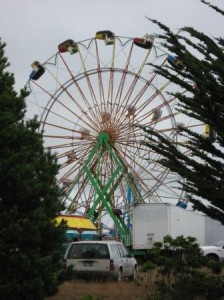Welcome back my friends to the show that never ends,
We’re so glad you would attend, come inside, come inside.
Karn Evil 9, Keith Emerson, Greg Lake and Peter Sinclair
Brain Salad Surgery ,Emerson, Lake and Palmer
I just got back from the 20th annual Mendocino Coast Writers Conference, held at the Fort Bragg campus of the College of the Redwoods. The small, utilitarian college is located directly south of the Noyo Harbor Bridge, with a view of the headlands.
It turned out the carnival was in town the same week as the conference, setting up in the field right next to the campus. At first it seemed like a joke. “The carnival’s in town,” could have been about us as much as the clanking rides and the booths and appliances in nail-polish-bright colors. Perhaps the locals anywhere roll their eyes and say, “The carnival’s in town,” whenever an outside group has a conference in their area.
I saw the two Ferris wheels every morning when I drove in, and I started to think about carnivals and writing.
Each morning I looked at the wheels and another swirly-ride thing from my adult perspective. The first morning of the conference the conference director politely admonished us to keep valuables out of sight and to lock our cars. “I sound like I’m being mean to carnies, and I don’t want to be,” she said, and we all chuckled because we knew exactly what she meant.
Carnivals are generally treated as sinister places in works of fiction, usually a battle ground for good and evil. Ray Bradbury wrote a terrifying coming-of-age fantasy story in which the carnival comes to town. Neil Gaiman starts Mirrormask in a carnival. Then there was the wonderful, two-season Carnivale on HBO, set in the 1930s during the dust bowl, with its power struggle between two avatars. Carnivals are places of trickery, where the face turned toward the audience, the town-dweller, the rube, isn’t the true face. They are places that need darkness to make the lights and colors more bright and seductive. The rides are fun, but you don’t want to look too closely at how they are bolted together. You don’t know where the carnival came from, and once it breaks down and moves on, you don’t know where it’s going.
All that, somehow, seems like writing and reading fiction.
The finished product is like the carnival at night; smells of cotton candy, popcorn, hot dogs and sweat; bells, music, shrieks of the kids in the rides; flashing lights, little mysteries and wonders, the occasional pocket of shadow. Keep one hand on your wallet. The faces turned toward you don’t look the same right now, smiling and ushering you in, as they will at eight o’clock tomorrow morning. And please don’t think too much about how that ride you are sitting in, screaming, and loving it, has been bolted together.
I’ll take your money. I’ll give you a thrill ride. For the duration, you’ll be back to being a kid. It doesn’t matter that the food has little nutritional value. It’s about fun, and maybe, a little bit, it’s about you wondering about that dark corner, that pocket of shadow. Then you leave and go home, back to your sunlit well-ordered life. Maybe some morsel of what happened sticks with you, awakens a small sense of magic in you that up until now had been sleeping. And we, the carnies, the transients, break down our kingdom, load it into the trucks, and move on.
Did’ja hear? The carnival’s in town.

